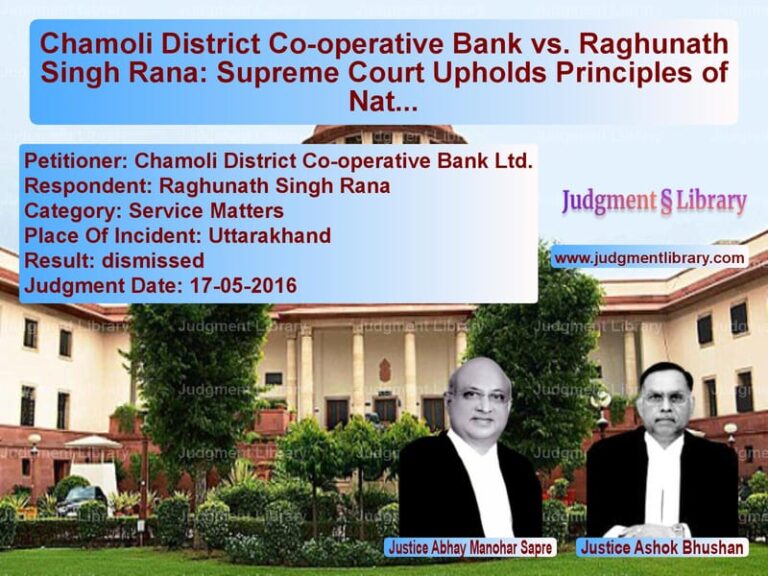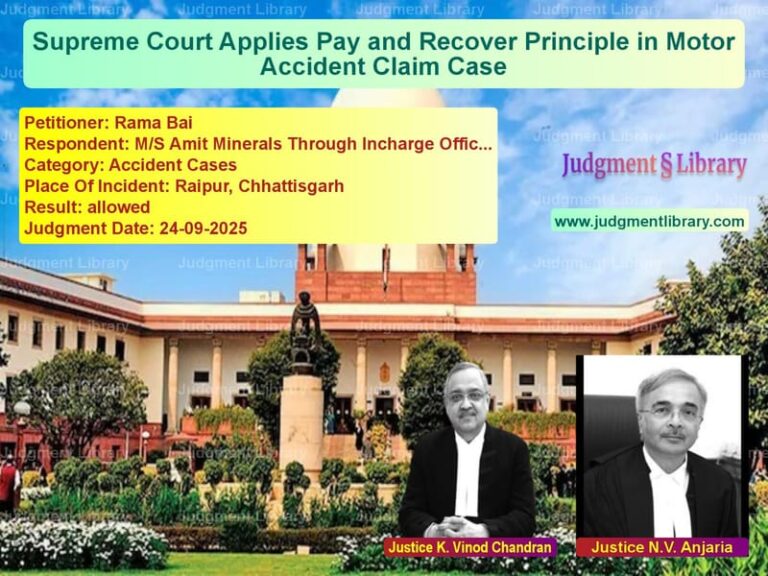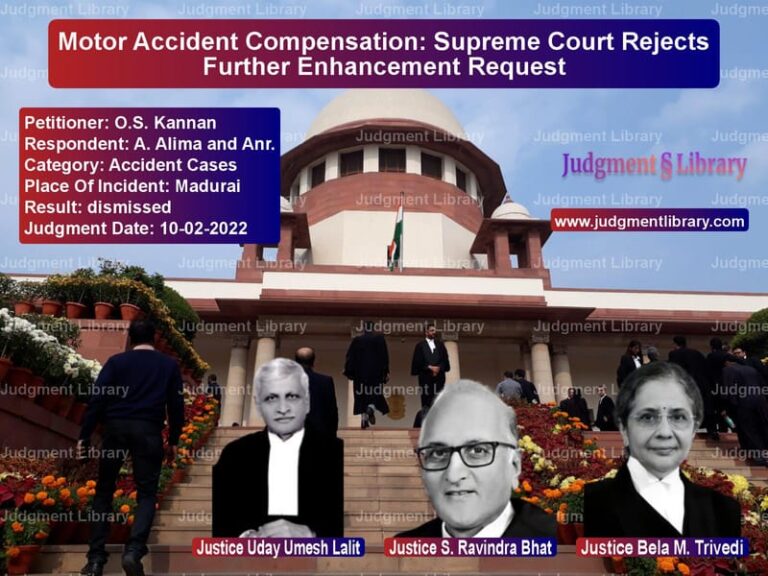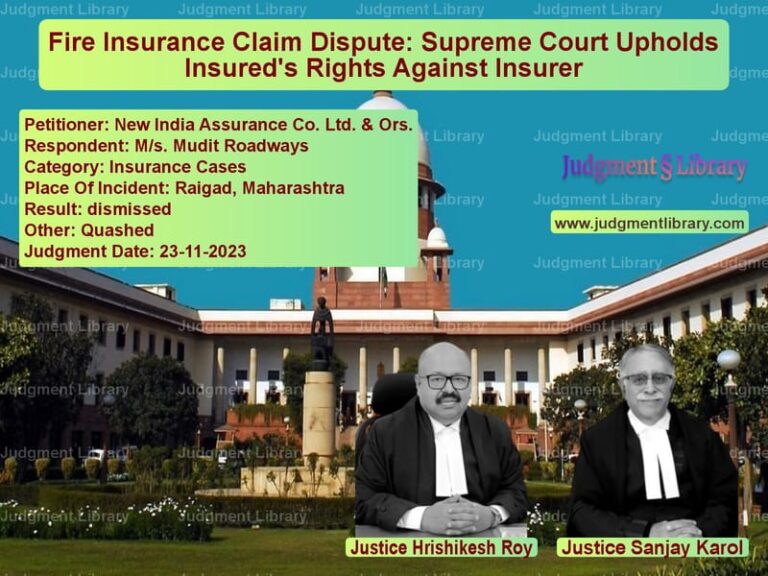Supreme Court Rules on Mumbai Redevelopment Dispute: Jariwala Chawl Tenants Get Justice
The case of Jagdish Mavji Tank (Dead) Through Lrs. & Ors. vs. Harresh Navnitrai Mehta & Ors. was a long-standing dispute regarding the redevelopment of Jariwala Chawl, a residential property situated at Plot No.231, T.H. Kataria Marg, Mahim, Mumbai. The Supreme Court had to determine whether the builder had failed to comply with redevelopment obligations and whether the tenants should be granted relief.
Background of the Case
The legal battle over the redevelopment of Jariwala Chawl started in 2006 when tenants and occupants of the chawl filed a writ petition in the Bombay High Court. They sought a direction for redevelopment under the provisions of the Mumbai Building Repair and Reconstruction Board (MBRRB) and the Maharashtra Housing and Area Development Authority (MHADA).
Key developments in the case:
- 2004: A meeting chaired by the Chief Minister of Maharashtra decided that the property would be redeveloped by Raj Doshi Exports Pvt. Ltd. in joint collaboration with MHADA.
- 2006: Tenants filed a writ petition in the Bombay High Court, seeking redevelopment of the chawl under Development Control Regulations (DCR) 33(7) and 33(9).
- 2016: The Bombay High Court directed MHADA to assess which developer had the support of 70% of tenants.
- 2017: The Supreme Court ruled that Raj Doshi Exports Pvt. Ltd. was entitled to redevelop the property, based on 78.89% tenant consent.
- 2021: Tenants filed a contempt petition against the builder, citing failure to complete the redevelopment project within the stipulated timeframe.
- 2022: The Supreme Court warned the builder and MHADA for non-compliance and directed that redevelopment be completed without further delays.
Petitioners’ Arguments
The tenants of Jariwala Chawl, through their legal representatives, argued:
“The builder has failed to complete the redevelopment within the agreed timeline, causing undue hardship to the tenants who have been waiting for decades.”
Key points raised:
- The builder failed to complete the project despite Supreme Court’s 2017 order.
- Tenants were left without proper housing for over 25 years due to the delays.
- MHADA imposed unnecessary conditions, such as requiring sub-division of the plot, further delaying the process.
- The builder should be held in contempt of court for non-compliance.
Respondents’ Arguments
The builder, Raj Doshi Exports Pvt. Ltd., and MHADA defended themselves by arguing:
“The delays were caused by bureaucratic hurdles and regulatory approvals required by MHADA and the Mumbai Municipal Corporation (MCGM).”
Key counterarguments:
- Regulatory requirements from MHADA and MCGM caused delays.
- The builder had secured all necessary permissions and was now ready to proceed.
- MHADA’s demand for land sub-division was contrary to the Supreme Court’s previous ruling.
Supreme Court’s Observations
The Supreme Court bench, comprising Justices L. Nageswara Rao and B.R. Gavai, expressed disappointment with the failure to complete the redevelopment.
The Court stated:
“The tenants have been eagerly waiting for the construction of flats for more than 25 years. We are convinced that there is gross negligence on the part of the builder in not complying with the directions of this Court.”
Key findings:
- The builder was guilty of delaying construction despite a clear court order.
- MHADA also contributed to the delays by imposing unnecessary conditions.
- The redevelopment must be completed within a strictly monitored timeframe.
- Failure to comply will result in further legal action.
Final Ruling
The Supreme Court issued strict directions for redevelopment:
- The builder must complete the project within 36 months from the date tenants vacate the premises.
- Tenants must be paid ₹25,000 per month in rent compensation during the interim period.
- Each eligible tenant must receive a minimum 508 sq. ft. flat in the redeveloped building.
- Failure to comply will result in contempt proceedings against the builder and MHADA.
Conclusion
The Supreme Court’s ruling ensures that long-delayed redevelopment projects are not stalled due to bureaucracy or builder negligence. The decision provides much-needed relief to tenants who have been waiting for decades, reinforcing the judiciary’s role in protecting housing rights.
Petitioner Name: Jagdish Mavji Tank (Dead) Through Lrs. & Ors..Respondent Name: Harresh Navnitrai Mehta & Ors..Judgment By: Justice L. Nageswara Rao, Justice B.R. Gavai.Place Of Incident: Mumbai, Maharashtra.Judgment Date: 19-04-2022.
Don’t miss out on the full details! Download the complete judgment in PDF format below and gain valuable insights instantly!
Download Judgment: jagdish-mavji-tank-(-vs-harresh-navnitrai-me-supreme-court-of-india-judgment-dated-19-04-2022.pdf
Directly Download Judgment: Directly download this Judgment
See all petitions in Property Disputes
See all petitions in Damages and Compensation
See all petitions in Judgment by L. Nageswara Rao
See all petitions in Judgment by B R Gavai
See all petitions in allowed
See all petitions in Remanded
See all petitions in supreme court of India judgments April 2022
See all petitions in 2022 judgments
See all posts in Civil Cases Category
See all allowed petitions in Civil Cases Category
See all Dismissed petitions in Civil Cases Category
See all partially allowed petitions in Civil Cases Category







